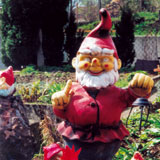Rent
Rent, or "Miete" or "Monatsmiete" in German, is the amount paid by the tenant ("Mieter") to the landlord ("Vermieter") every month. This is the "Kaltmiete" (cold rent) plus the "extra costs" such as garbage disposal, street and house cleaning costs, heating and water costs. All of these costs together are called the "Warmmiete" (warm rent). Some of the additional costs are dependent on personal usage such as heating and water costs. The others depend on the size of the apartment. Electricity and telephone costs are normally paid directly by the tenants themselves. The ancillary costs and the costs for gas and electricity are paid monthly at a predetermined fixed rate. Once a year the meters are read and the difference is either refunded by the respective utility company, or the extra costs must then be paid to them.
Rent comparisons can be made in each town or section of the city with the help of a table called the "Mietspiegel". This table lists the rent prices in any area. Thus it is possible to check if the rent is appropriate for that area or even if it is illegal to charge such a high rent. The "Mietspiegel" can be found at the local town hall or at the tenant associations ("Mieterverein"), see below. If the rent is above the legal limit, you can consult a lawyer or a tenant association and take action to reduce the rent.
Rent Contract
When an apartment is rented a rent contract ("Mietvertrag" is signed. This contract contains the particular details of the apartment (the cost of the rent, the size of the apartment, the number of rooms, etc). The rent contract also contains the rights and obligations of the tenant and landlord (period of notice, house pets, etc). Once the contact is signed, both parties accept the contract and are legally bound to the contract. But there are also certain legal rules that limit the validity of certain clauses within rent contracts. Most landlords insist that tenants have a valid bank account.
A deposit ("Kaution") normally has to be paid by a tenant as a financial guarantee in case of damage to the apartment. The deposit is normally 1 or 2 months cold rent and is not permitted to be more than 3 times the net cold rent. The deposit has to be placed in a bank account with interest. The tenant receives the deposit plus interest after moving out of the apartment as long as this occurs according to the terms of the rent contract. The landlord is allowed to deduct money from the deposit to pay for any repairs to the apartment.
Tenant Protection
Tenant protection associations, known as "Mieterschutz-Vereine", represent the interests of the tenant. Many relationships between the tenant and landlord are unproblematic. But if conflicts do arise then these tenant protection associations will provide help for tenants. Tenant protection associations have offices in most towns and cities. The website of the national tenant association ("Deutscher Mieterbund") can be found at ![]() www.mieterbund.de.
www.mieterbund.de.
Pets

Whether or not pets may be kept in an apartment must be discussed with the landlord. If a tenant wants to have a pet in the flat where they already live then the rent contract or the landlord can be consulted to see if this is allowed. House pets include dogs, cats, birds, hamsters, guinea pigs, etc. Keeping animals such as sheep and pigs, etc, is generally not permitted.
Dog owners must pay a special dog tax and certain inoculations are necessary. Information can be found at your local town hall. So-called fighting dogs and other dogs classified as dangerous are subject to certain regulations. Dog owners are required to remove all excrement left by their animals on the streets, although this is often not done.
House Caretaker, House Management
In houses with a number of tenants, there is often a house caretaker ("Hausmeister") and a house management ("Hausverwaltung"). The house caretaker and house management are responsible for organisational measures and repairs within the house and the apartments.
House Rules
In larger apartment blocks with numerous tenants there is normally a set of house rules ("Hausordnung"). Certain problems associated with living together in a joint house are addressed in the house rules, for example, allocating who is responsible for cleaning the stairs (which are called "Hausflur" or "Treppenhaus" in German) on which days, or laying down the times when residents must maintain quiet within the house.
Winter Service and Street Cleaning

If there is no house caretaker then the residents are bound by law to remove snow and ice from in front of their house during winter. This is generally stated in the rent contract. If the tenants are responsible for removing snow and ice then they are liable for all injuries incurred if they fail to meet their obligations. In some regions the streets also have to be swept once a week.
Neighbours

Neighbours are the other tenants living in the house or those in adjoining houses. In Germany most new tenants introduce themselves to their direct neighbours (i.e. those that live on the same floor). Of course you don’t have to follow this tradition. Some people are pleased to see new faces, while others don’t care who lives in the same house.
Rent Contract Notice and Protection
There are certain periods of notice valid for tenants. These are defined in the rent contract or in the rent laws. Open-ended rent contracts usually have a period of notice of three months. The landlord cannot cancel the rent contract without a reason. This is referred to as "Mieterschutz" in German. If a conflict arises with your landlord, contact a lawyer or a tenant protection association.
